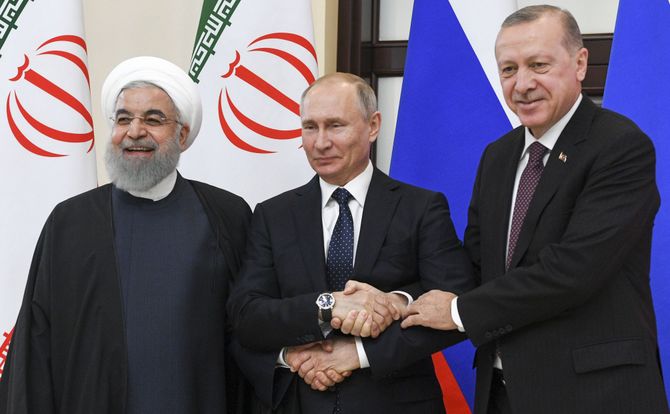Changing scenarios in the Middle East maze
As Iran becomes stronger in the Middle East, two opposite alliances are taking shape. This was exemplified by two high-profile summits in mid-February: one led by the U.S. in Warsaw, and the other in Sochi between Russia, Turkey and Iran.

In mid-February, a summit on Middle East policy was held in Poland, on the initiative of the United States. Though it was not officially declared, the main purpose of the meeting was to forge an alliance against an increasingly assertive Iran. The most prominent attendees were U.S. Vice President Mike Pence, U.S. Secretary of State Mike Pompeo and Israeli Prime Minister Benjamin Netanyahu. Several Arab countries were represented by cabinet-level leaders, whereas most European states sent second-tier officials. Iran was not invited and Tehran officially conveyed its disapproval to Poland.
Secretary Pompeo used strong words in denouncing Iran and Prime Minister Netanyahu even talked of war, though Israel’s foreign ministry played down his comments. The enormous tension with Iran was obvious. One interesting development showed how big a concern Iran has become: Bahraini Foreign Minister Khalid bin Ahmed Al Khalifa openly mooted establishing diplomatic ties with Israel. This is a logical next step in the Arab world, now that Oman has begun opening up to Israel – Prime Minister Netanyahu was officially received there just a few months ago.
Trilateral meeting
At the same time, the quarterly summit between Turkey, Russia and Iran took place in Sochi. The official topic of discussion was Syria. Since their 2017 meeting in Astana, the officials from the three countries have met regularly. Despite them having big differences on Syria, the meetings have led to tangible results.
Turkey previously had excellent relations with both the U.S. and Israel, but has recently been at odds with the West. There is some logic behind Ankara’s disappointment: the West took its alliance with Turkey for granted and ignored its national interests when it came to the situations in Iraq and Syria. At the same time, European countries did not treat Turkey fairly in European Union accession talks.
Although the Warsaw meeting was not specifically on Syria, the speeches and results (or lack thereof) were certainly a concern for the trilateral meeting.
New alliances
It cannot be denied that Iran’s support for Hezbollah in Lebanon and terrorism in Europe, as well as its role in the war in Yemen, are big concerns and require a response.
The question is what options a possible American-Arab-Israel alliance against Iran might have. Although Iran’s economic situation is precarious, it is not likely to give in to pressure from the U.S. and its allies. Russia supports Iran’s position, while European countries mostly remain either neutral or supportive of Tehran. Turkey, although uneasy about Iran’s regained stronghold on Syria, is not a friend of the informal Arab alliance of Saudi Arabia, the United Arab Emirates, Bahrain, Egypt and Oman.
War with Iran is unlikely in the intermediate future. However, concern about Iran’s potential aggression might lead to closer relationships between Israel and its former Arab foes. Together with the U.S., an alliance to contain Iran is beginning to form and strengthen.
